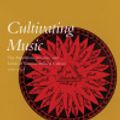
Cultivating Music: The Aspirations, Interests, and Limits of German Musical Culture, 1770-1848
David Gramit
German and Austrian music of the late eighteenth and nineteenth centuries stands at the heart of the Western musical canon. In this innovative study of various cultural practices (such as music journalism and scholarship, singing instruction, and concerts), David Gramit examines how music became an important part of middle-class identity. He investigates historical discourses around such topics as the aesthetic debates over the social significance of folk music, various comparisons of the musical practices of ethnic "others" to the German "norm," and the establishment of the concert as a privileged site of cultural activity.Cultivating Music analyzes the ideologies of German musical discourse during its formative period. Claiming music's importance to both social well-being and individual development, proponents of musical culture sought to secure the status of music as an art integral to bourgeois life. They believed that "music" referred to the autonomous musical work, meaningful in and of itself to those cultivated to experience it properly. The social limits to that cultivation ensured that boundaries of class, gender, and educational attainment preserved the privileged status of music despite (but also by means of) their claims for the "universality" of their canon. Departing from the traditional focus on individual musical works, Gramit considers the social history of the practice of music in Austro-German culture. He examines the origins of the priv
Booko found 2 book editions
Product filters
| Product |
Details
|
Price
|
New
|
Used
|
|---|---|---|---|---|
|
|
New: Click to Check
Used: Click to Check
|
New: Click to Check
Used: Click to Check
|
Click to Check | Click to Check |
|
|
New: $94.45
Used: $35.91
|
New: $94.45
Used: $35.91
|
$94.45 | $35.91 |
Booko collects this information from user contributions and sources on the internet - it is not a definitive list of editions. Search Booko for other editions of Cultivating Music: The Aspirations, Interests, and Limits of German Musical Culture, 1770-1848.



















